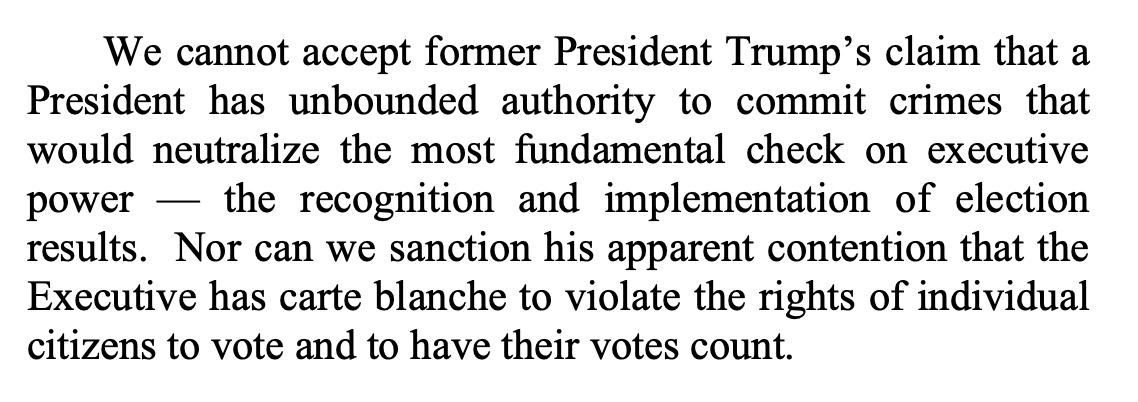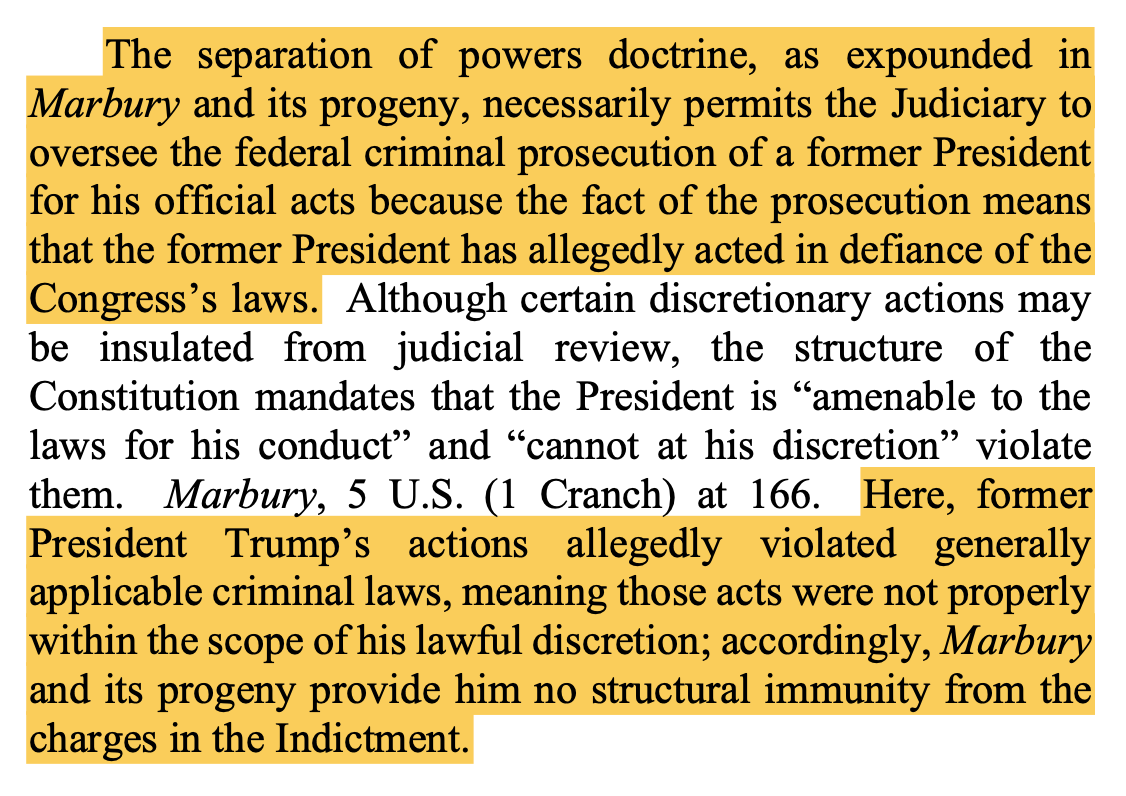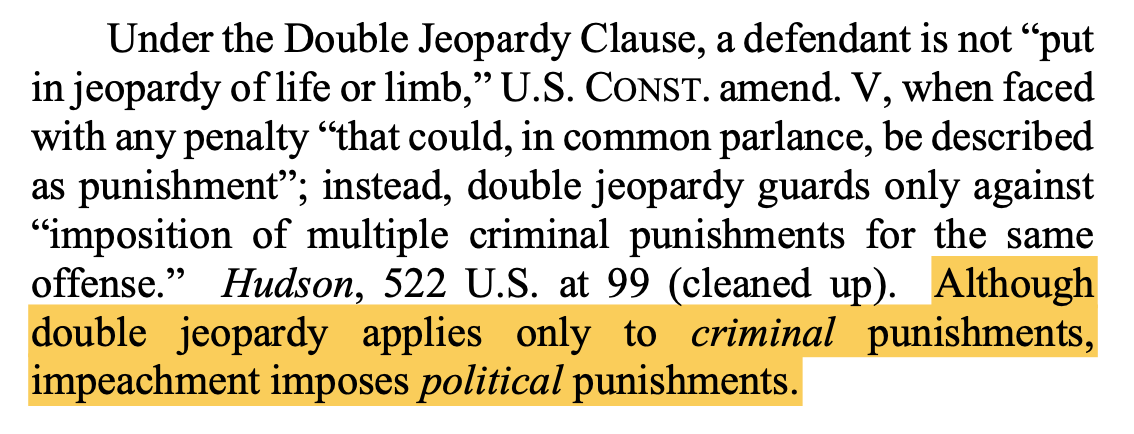D.C. Circuit panel unanimously rejects Trump's criminal immunity claim
The court's judgment sets up a likely quick trip to the Supreme Court if Trump wants to continue arguing that a former president is immune from criminal prosecution.
On Tuesday morning, a three-judge panel of the U.S. Court of Appeals for the D.C. Circuit unanimously rejected Donald Trump’s claims that he is immune from criminal prosecution for life for acts he took while president.
The court, even more dismissively, rejected Trump’s argument that “double jeopardy principles” block his federal prosecution in D.C. because he was not convicted in the impeachment that followed his actions surrounding Jan. 6, 2021.
“For the purpose of this criminal case, former President Trump has become citizen Trump, with all of the defenses of any other criminal defendant,” the court concluded in its 57-page opinion. “But any executive immunity that may have protected him while he served as President no longer protects him against this prosecution.”
In issuing its heavily-anticipated ruling, the three-judge panel, which heard arguments Jan. 9, backed U.S. District Judge Tanya Chutkan’s ruling that Trump is not immune from prosecution because he used to be president and that “double jeopardy principles” do not apply here, let alone block Trump’s prosecution.
The panel consisted of Judge Karen Henderson, a George H.W. Bush appointee, and Judges Florence Pan and J. Michelle Childs, Biden appointees, and the decision was issued per curiam, meaning for the court — and unsigned.
“It would be a striking paradox if the President, who alone is vested with the constitutional duty to ‘take Care that the Laws be faithfully executed,’ were the sole officer capable of defying those laws with impunity,” the court stated at one point, rejecting the paradox — and echoing a question Henderson had asked Trump’s lawyer during the January arguments.
The court’s reasoning and conclusion was strong, stark, and damning — of the alleged actions taken by Trump and of his arguments against prosecution.
I’ll get into the specifics of the ruling below, but the big question now that we got the ruling is what happens now. In addition to the opinion, the court issued the judgment — the bottom-line resolution of the case — addressing what is going to happen with the mandate. The mandate is the order to the district court returning jurisdiction of the case to the lower court. Here, the issuance of the mandate would mean Chutkan would be free to re-start proceedings advancing toward trial.
So, the mandate
As such, the discussion in the judgment regarding the mandate is especially important. So, what did the D.C. Circuit say on that front?
What’s this mean?
First of all, there are three options for how Trump can respond to the ruling: He can accept the ruling, he can seek en banc review from the full D.C. Circuit of the panel’s opinion, or he can ask the Supreme Court to hear the case.
If Trump does not accept the ruling — which of course he won’t — then the panel has, essentially, forced Trump’s hand toward going immediately to the Supreme Court. That is so because the court is only going to withhold the issuance of the mandate until Monday — unless Trump goes to the Supreme Court and asks them to issue their own order preventing the D.C. Circuit from issuing the mandate while it considers whether to hear Trump’s appeal of the D.C. Circuit opinion. If Trump were to seek en banc review, on the other hand, the judgment will not stop the issuance of the mandate on Monday.
Yes, there are a lot of confusing, procedural moving pieces there, but, essentially the judgment says that the court is fairly certain of its ruling and that it is only going to keep Chutkan from restarting the proceedings until the Supreme Court decides whether it is going to keep the proceedings on hold. In other words, the D.C. Circuit wants the Supreme Court to own more delay if it wants it.1
Trump’s spokesperson issued a statement after the ruling saying that Trump will appeal, but it does not specify to which court he will be appealing.
Now, the numbers.2
It’s not clear, even aside from the mandate issue, that en banc review is a real possibility here. The full appeals court already skews left, with seven Democratic appointees and four Republican appointees. The presence of Henderson on the panel leaves only three Republican appointees — incidentally, all Trump appointees — as possible votes for en banc review unless three of the five other Democratic appointees on the panel were also to vote for en banc review. In short, en banc review is extremely unlikely.
As to the Supreme Court, Trump would need five justices to agree to grant an application to stay the mandate. However, it only takes four justices to grant certiorari and actually review the D.C. Circuit’s decision on the merits. So, what’s that mean? If there are three or fewer justices who want to review the decision, then neither would be granted — although the dissenting justice(s) could take time writing a dissent from that decision, leaving the D.C. Circuit’s halt on the mandate’s issuance in place during that time. If there are four justices seeking review, the numerical disconnect between granting a stay and granting certiorari could make things a little confusing and there likely would be internal discussions among the justices about how to quickly review the case in exchange for a fifth vote to stay the mandate while the appeal is heard. If there are five or more justices seeking review, the mandate almost surely would be stayed — although there could still be efforts to push for speedy review at the high court.
Back to the opinion
In addition to a jurisdictional question (raised by American Oversight in an amicus curiae brief) about whether the court had jurisdiction to hear the appeal now (instead of after trial), the court addressed three primary issues raised by Trump on appeal: whether a president is immune, whether public policy considerations should counsel against prosecution, and whether “double jeopardy principles” bar Trump’s prosecution.
However, it is also important to pause for a moment and address the court’s opening. This is especially important coming two days before the U.S. Supreme Court is set to hear arguments over the Colorado Supreme Court’s decision that Trump cannot be on that state’s primary ballot because he “engaged in insurrection” in connection with his actions surrounding Jan. 6, 2021.
To that, the D.C. Circuit panel did not mince words:
[H]undreds of people who breached the Capitol on January 6, 2021, have been prosecuted and imprisoned. And on August 1, 2023, in Washington, D.C., former President Trump was charged in a four-count Indictment as a result of his actions challenging the election results and interfering with the sequence set forth in the Constitution for the transfer of power from one President to the next.
Although the court goes on to note elements claimed in the indictment as allegations — which is appropriate — and note that the special counsel’s case would still need to be proved at trial, it is important that, in many instances as above, the court did not shy away from the facts.
As the court stated at one point later in the opinion, “Former President Trump’s alleged efforts to remain in power despite losing the 2020 election were, if proven, an unprecedented assault on the structure of our government.”
The court’s response to the American Oversight argument is important, procedurally, and the court took its time with it, but the bottom line is that it concluded it could hear Trump’s appeal on this issue now and not only after trial.
That gets us to Trump’s arguments.
The debate over Trump’s immunity argument has circled around no less a foundational case than Marbury v. Madison, the case known for establishing the court’s principle of judicial review, but, to get there, the case is actually a foundational discussion of separation of powers.
“Former President Trump misreads Marbury and its progeny,” the court held. “Properly understood, the separation of powers doctrine may immunize lawful discretionary acts but does not bar the federal criminal prosecution of a former President for every official act.”
The main takeaway is that, while discretionary decisions by a president may be unreviewable by courts, other actions (called ministerial) can be reviewable. As to this issue of post-presidential immunity specifically, here is the key part of the court’s opinion:
It’s a very smart statement: Post-presidency prosecution, when called for, actually supports — not threatens — separation of powers because a federal criminal prosecution is an allegation that someone violated a law or laws passed by Congress.
In conclusion: “Former President Trump lacked any lawful discretionary authority to defy federal criminal law and he is answerable in court for his conduct.”
That’s not the end of that, though. The court also examined whether “public policy” considerations would counsel against allowing a case like this.
The court made clear very early on in this section this the public policy questions here do not favor Trump, however, stating that “our analysis is specific to the case before us, in which a former President has been indicted on federal criminal charges arising from his alleged conspiracy to overturn federal election results and unlawfully overstay his Presidential term.”
When the court dived into the public policy considerations, it concluded — I think importantly — that the possibility of criminal liability could “deter possible abuses of power.”
Trump also argued, as the D.C. Circuit detailed it, that allowing his prosecution to proceed “will subject future Presidents to politically motivated prosecutions as soon as they leave office.”
To that, the court concluded the risk was “slight,” noting that “former President Trump acknowledges that this is the first time since the Founding that a former President has been federally indicted.”
On the other side of the “public policy” considerations, the court highlighted that there is “a profound Article II interest in the enforcement of federal criminal laws” and, as to Trump specifically, “the allegations of the Indictment implicate the Article II interests in vesting authority in a new President and the citizenry’s interest in democratically selecting its President.” The court went so far as to note that “The alleged conduct also violated Article II’s mandate that a President ‘hold his Office during the Term of four Years.’”
In short, the D.C. Circuit panel concluded there is neither a requirement of immunity for former presidents nor do public policy considerations counsel in favor of immunity here.
As to Trump’s argument that “double jeopardy principles” that Trump’s lawyers derived from the Impeachment Clause bar his prosecution here because he was not convicted by the Senate in his second impeachment, the D.C. Circuit strongly — and bluntly — rejected his claim.
Furthermore, the court also used Trump’s reliance on the Impeachment Clause to (further) undercut his immunity argument, noting, “Former President Trump also implicitly concedes that there is no absolute bar to prosecuting assertedly ‘official’ actions” because he acknowledges that the Impeachment Clause would allow for prosecution if he had been convicted by the Senate.
Finally, the D.C. Circuit panel summed up all of this in ending its opinion:
In conclusion
I have been critical of the time it took the D.C. Circuit to reach a ruling, and I continue to think the court could and should have resolved the case more quickly. Tuesday’s opinion — and its clarity about how unmeritorious Trump’s arguments are — only reinforces that.
That said, we are here and I want to compliment the panel for its opinion, its forthrightness both about the importance of these issues and the weakness of Trump’s arguments, and (for the most part, see the footnote) its handling of the mandate issue.
The only (reasonable) way the D.C. Circuit could have been more aggressive here is if it set a date certain by which the mandate would issue if the Supreme Court did not issue a stay. (I don’t think issuing the mandate immediately would have gone over well with the Supreme Court, so I think giving some time was important.)
This paragraph and the following two paragraphs were added at 4:50 p.m., after initial publication.










![We have balanced former President Trump’s asserted interests in executive immunity against the vital public interests that favor allowing this prosecution to proceed. We conclude that “[c]oncerns of public policy, especially as illuminated by our history and the structure of our government” compel the rejection of his claim of immunity in this case. See Fitzgerald, 457 U.S. at 747–48. We also have considered his contention that he is entitled to categorical immunity from criminal liability for any assertedly “official” action that he took as President — a contention that is unsupported by precedent, history or the text and structure of the Constitution. Finally, we are unpersuaded by his argument that this prosecution is barred by “double jeopardy principles.” Accordingly, the order of the district court is AFFIRMED.16 So ordered. We have balanced former President Trump’s asserted interests in executive immunity against the vital public interests that favor allowing this prosecution to proceed. We conclude that “[c]oncerns of public policy, especially as illuminated by our history and the structure of our government” compel the rejection of his claim of immunity in this case. See Fitzgerald, 457 U.S. at 747–48. We also have considered his contention that he is entitled to categorical immunity from criminal liability for any assertedly “official” action that he took as President — a contention that is unsupported by precedent, history or the text and structure of the Constitution. Finally, we are unpersuaded by his argument that this prosecution is barred by “double jeopardy principles.” Accordingly, the order of the district court is AFFIRMED.16 So ordered.](https://substackcdn.com/image/fetch/w_1456,c_limit,f_auto,q_auto:good,fl_progressive:steep/https%3A%2F%2Fsubstack-post-media.s3.amazonaws.com%2Fpublic%2Fimages%2Fa095d8c8-5695-4dca-a6be-adad2cfe0ed7_1170x802.png)
I don't see why SCOTUS would take the case, other than trying to give trump yet another mulligan. The lower courts have decisively ruled on the issues and there doesn't seem to be any doubt or question whatsoever about where the Constitution or precedent stand on any of it.
"Every president faces difficult decisions...whether to intentionally commit a federal crime should not be one of them"
Touché!
And I wonder - as you do, Chris - whether this decision - its rigor, its unanimity - will consciously or otherwise play into Thursday's §3 DQ hearing, and/or deliberations following arguments...hard to believe that it won't, especially the three-judge opinion's recitation of tRump's attempts to unconstitutionally and criminally prevent the peaceful transfer of power to the duly-elected successor, Joe Biden, all neatly and comprehensively stated in the opinion.